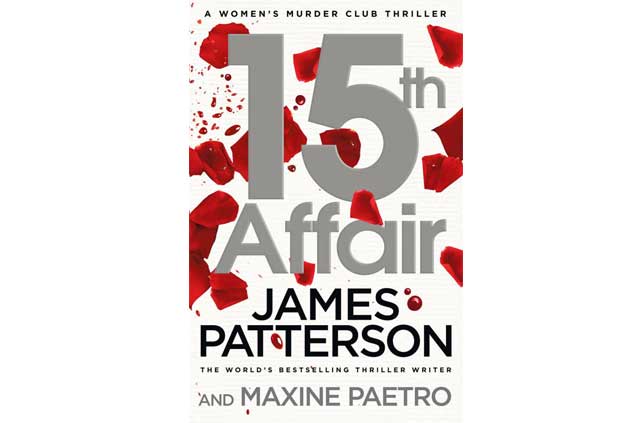If the majority of cloak and dagger scriveners are to be believed, look no further than the CIA for enemy spies (or MI6 as the case may be). In their espionage thrillers, both top secret intelligence agencies are infested with foreign moles and domestic traitors, often in high positions.
Ferreting them out isn't easy, yet it does happen: Aldrich Ames in the US, Kim Philby and company in the UK, for example. The tip of the iceberg, retort the novelists. Their stories are at once imaginative and researched.
In 15th Affair by James Patterson and Maxine Paetro, the focus is on two of their ongoing literary creations. Lindsay Boxer, the wife, is a homicide detective sergeant with the San Francisco Police Department. Husband Joe, the father of their young daughter, is a CIA agent.
Though in different fields, their cases occasionally mesh. Lindsay is assigned to investigate a mass murder -- four bodies in two adjoining hotel rooms. One room has equipment tracking its neighbour. Tapes enable the cops to identify the bodies. But who is the woman who fled the scene?
Enter Joe, who recognises Alison Muller as his CIA underling. One of the victims is Chinese. The FBI has been gathering evidence that Chan was a spy and Alison was his playmate. The law enforcement authorities agree, correctly, that she's one too. To Lindsay's consternation, she learns more.
Joe and Alison are having an affair. The story's subplot has his good wife agonising over this. She confronts him and he admits it. He begs, but how can she ever forgive him? She hates him. She loves him. Can she ever trust him again? Divorce appears to be the only answer.
With the help of the Royal Canadian Mounted Police, Alison is prevented from returning to China via Canada. She taunts Lindsay re Joe's infidelity before a CIA interrogator makes her life a living hell in an underground cell.
The reader doesn't learn why she defected. James Patterson, on his own or with one of his stable of co-authors, turns out works of fiction like a dynamo. He is responsible for several series' of literary creations. He isn't in a rut and the plots are fairly original. Though he won't win a Nobel Prize in Literature, his books are compulsive page-turners.

Pharaoh by Wilbur Smith HarperCollins 374pp Available at Asia Books and leading bookshops 750 baht
A world to himself
Africa-born octogenarian Wilbur Smith has penned over 30 novels, all set in the Dark Continent, not focusing on any one period in its recorded history. His meticulous research makes his fiction plausible. This reviewer's regret is that with his expertise, they should be factual.
Egypt, South Africa and the lands between are grist for his mill. His variety of plots include Pharaohs, apartheid, Somali pirates, mercenaries, dictators, tribal wars. Smith's descriptions of tribal massacres are so vivid they'll put you off your food. The romances are more tepid.
Pharaoh harkens back to ancient times, when Egypt was glorious. Its wealth was too tempting for barbarians to resist. Egypt ingeniously sent them off, the Hyksos an exception. They arrived with an invincible weapon: chariots. Instead of quelling them, the legions were slaughtered.
Egyptian commander Taita had the foresight to appropriate some chariots before leading the flight of the survivors. In the wilderness, he copied and improved on them. Rebuilding his forces, obtaining an ally, he took on the Hyksos again and beat them. The golden city of Luxor was saved.
The story moves into its second plot. Fatally wounded in battle, a good Pharaoh is succeeded by an evil one: his son-in-law Utteric.
Half the book (Smith doesn't number his chapters) is devoted to the cruel things he does, arresting Taita and all the decent ministers among them.
Overthrowing a Pharaoh is no easy matter, but there are good members of the ruling family waiting in the wings. And Taita has influential friends. Another battle and Utteric takes to his heels. Which leads into the best part of the tale. Taita and Princess Serrena track the fugitive to a leper colony.
The author's delineation of the afflicted is stomach-turning. The villain comes out from among them, sword swinging. The fray is bloody, Serrena wielding a sword of her own.
Wilbur Smith knows his way among Egypt's gods and weapons. He tells a good story in under 400 pages. He eschews ancient secrets in buried tombs.
With one or two exceptions, he literally has an entire continent to himself. After Pharaoh, read any of his other books. You'll be glad you did.

